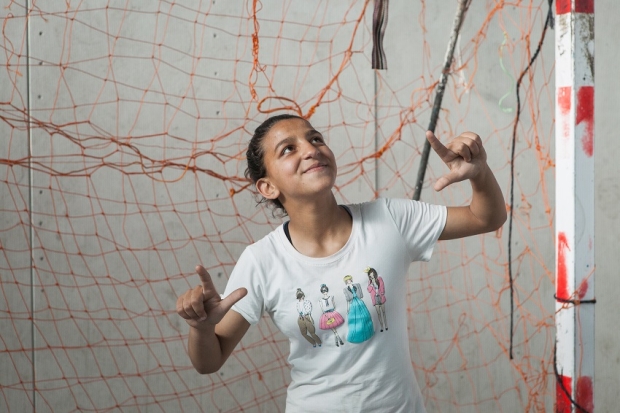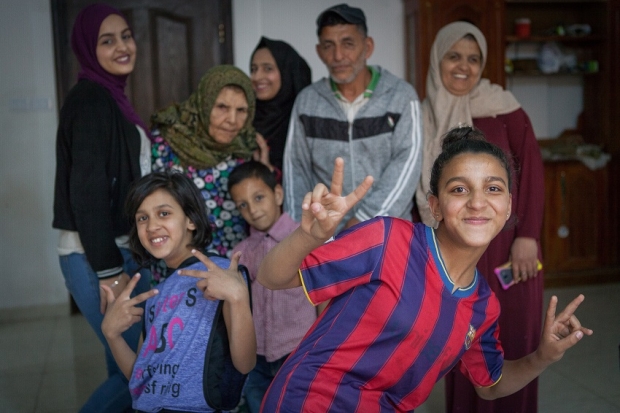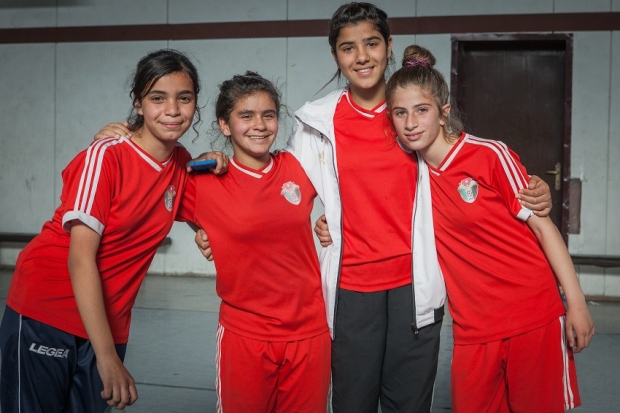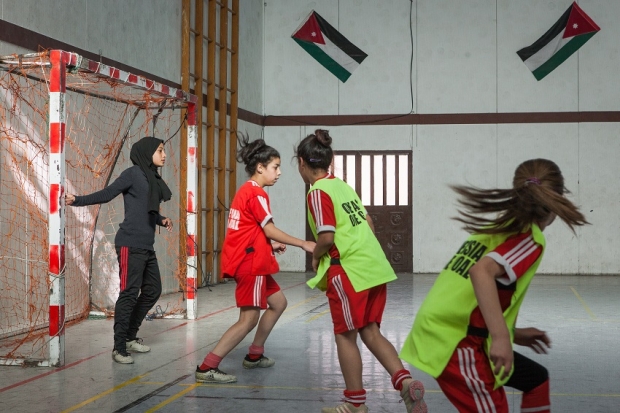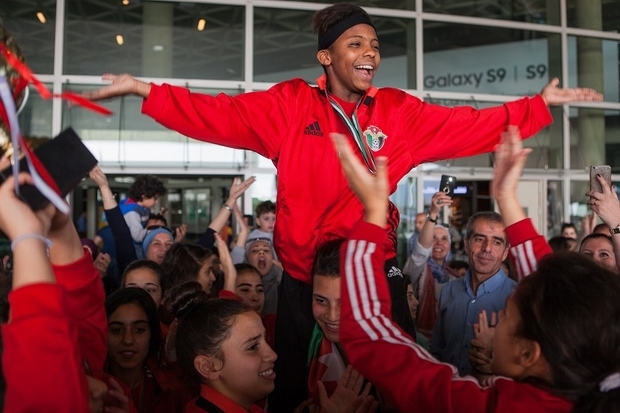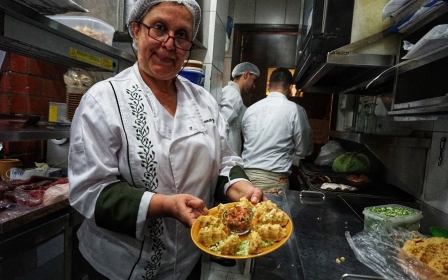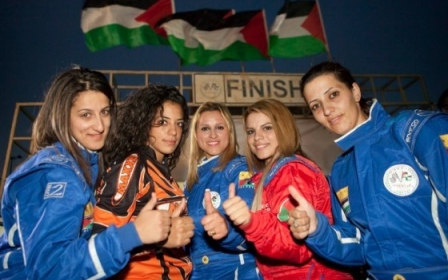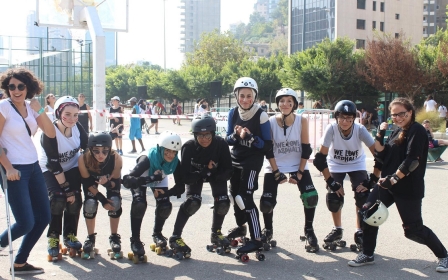Eyes on the prize: Jordanian girls set their sights on Women's World Cup
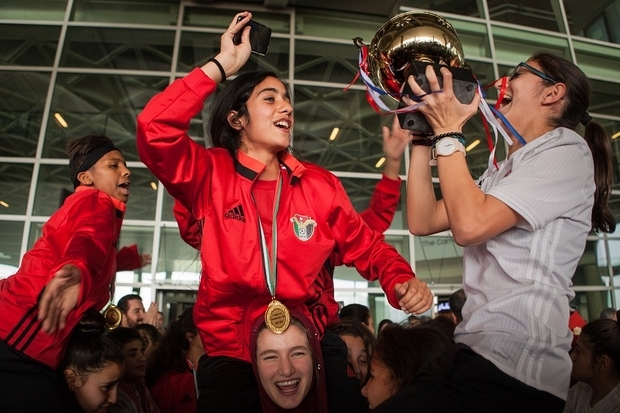
AMMAN – In a school gym in the heart of Zarka, a city 25 kilometres northeast of Jordan’s capital, Amman, a group of 30 girls aged 10 to 15 are playing football.
The girls are split into two groups of 15. The first group is training in how to control the ball by slaloming around small orange cones, while the second group is practising how to land the ball inside the net.
After a 90-minute training session that left the girls' cheeks as rosy as their numbered jerseys, they gather around their coach, Rana Alfatah.
“Here, all the girls want to become professional footballers. We are helping them make their dreams come true,” Alfatah said.
“Thanks to football, I go out, I get rid of my negative energy, and I make new friends,” she said.
Football is not only my dream, football is my whole life
- Marwa Owaimer
This training is part of the Prince Ali grassroots centres, a nationwide initiative led by the Jordan Football Association (JFA) to encourage young girls to play football. In 2005, Prince Ali, half-brother of King Abdullah II and president of the JFA, formed the first national female football team parallel to a nationwide programme including setting up federal training centres to encourage girls to play at an early age. Zarka's women's-only grassroots centre was one of the first to be created.
Owaimer started playing football five years ago with her 19-year-old sister, Yasmine. “I used to train her but she quickly became better than me,” laughed Yasmine.
Owaimer’s father, Adel, says he hopes that one day Marwa will become a professional football player. In January, Owaimer was spotted by the coach of the under-14s (U14) national team at a friendly match in Amman.
However, being of Palestinian descent, Owaimer doesn’t possess Jordanian citizenship – a requirement to join the national team. Her father, originally from Gaza, moved to Jordan after the 1967 Arab-Israeli war when he was welcomed as a refugee.
Despite the disappointment, Owaimer does not intend to take off her cleats.
'Not a sport for girls'
Three out of the four girls in the Owaimer family play football, which is normally a pastime frowned upon by citizens of this conservative city, as most families remain very traditional. The Owaimer family, a practising Muslim family, disagree with these conservative views and encourage their daughters to play the sport they love.
Here, all the girls want to become professional footballers. We are helping them make their dreams come true
- Rana Alfatah, coach
Marwa recently had a row with her next-door neighbour, who told her that football was not a sport for girls, and that her body was too weak to play.
“I hate these religious people. They have nothing to say to me. Football is not only my dream, football is my whole life,” says the teenager.
According to Belhassan Malouche, director of the JFA’s technical department, some citizens in more conservative parts of the country still frown upon girls who participate in training activities on the pitch, while girls training in centres in the capital Amman have the freedom to practise outdoors and feel less restricted.
It makes us very proud to see all our families together to welcome us
- Lujain Btoysh
“Fifty percent of society was neglected, can you imagine?” Malouche said, referring to women.
Spreading awareness throughout the country allows the JFA to reach as many girls as possible. “Having a large group from which to select the best players is the most important part of our strategy,” explained Malouche.
A heroes' welcome
More than 400 girls attend football practice three times a week after school at one of the 15 centres spread across Jordan, according to Zoubi.
“We teach them how to control the ball, make passes, heading. They develop coordination, agility and speed as well as knowledge of the rules of the game. All training sessions end with a game for the girls to have fun and practise what they have learned,” explains Zoubi.
On 14 April 2018, the U15 national team won the West Asian Football Federation Women’s Championship (WAFF) held in Dubai, beating the UAE, Jordan, Palestine, Syria, Lebanon, Oman and Bahrain. The girls received a heroes' welcome as they returned from Dubai at the Queen Alia international airport in Jordan where groups of families waved Jordanian flags to celebrate the victory.
In 2011, after a year of training at one of the grassroots centres in Amman, Btoysh was spotted by a federal supervisor affiliated with the JFA and became a player for the U14 national team.
We played with the boys on the street. Once we got into grassroots, we quickly became better than them. We learned how to pass, how to score goals. We knew the tactics and the rules of the game
- Alien Edwan
According to JFA statistics, more than half of the U15 national team went through a grassroots centre, while all of the U14 team members trained there.
“My year at grassroots was very important to me. The coaches have helped me make a lot of progress. Without them, I’d never have joined the national team,” said Btoysh, who represents Jordan in regional competitions.
Btoysh's friend Alien Edwan followed the same route. Edwan used to play football with Btoysh in the streets of Al Hashmi Al Shamali district in Amman. “We played with the boys on the street. Once we got into grassroots, we quickly became better than them. We learned how to pass, how to score goals. We knew the tactics and the rules of the game,” boasts Edwan.
For the next step, Al-Zoubi and Malouche have their eyes set on the FIFA Women's World Cup.
“Now our long-term objective is for them to qualify for the FIFA Women's World Cup. If we continue to invest as much in women's football, we can do it in five or six years," said Malouche.
Middle East Eye propose une couverture et une analyse indépendantes et incomparables du Moyen-Orient, de l’Afrique du Nord et d’autres régions du monde. Pour en savoir plus sur la reprise de ce contenu et les frais qui s’appliquent, veuillez remplir ce formulaire [en anglais]. Pour en savoir plus sur MEE, cliquez ici [en anglais].


